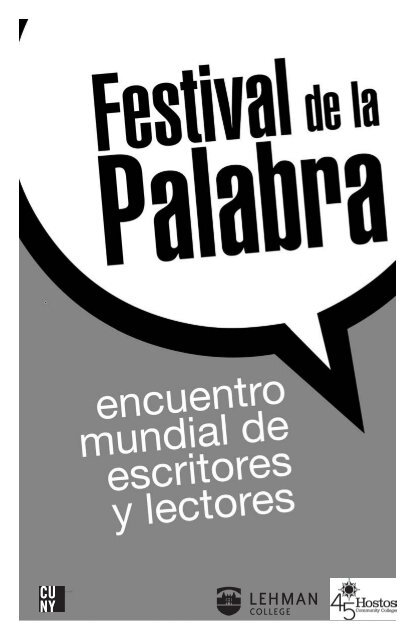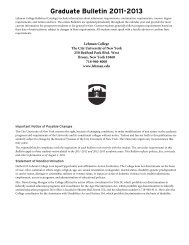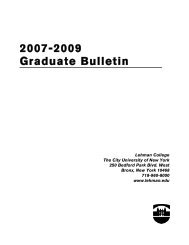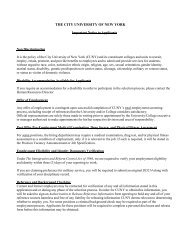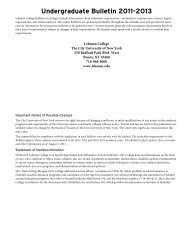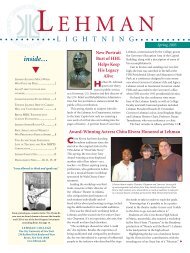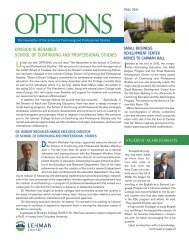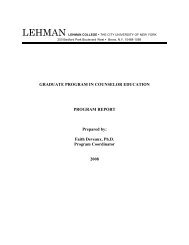Festival De La Palabra Of Puerto Rico In New York - Lehman College
Festival De La Palabra Of Puerto Rico In New York - Lehman College
Festival De La Palabra Of Puerto Rico In New York - Lehman College
Create successful ePaper yourself
Turn your PDF publications into a flip-book with our unique Google optimized e-Paper software.
<strong>Festival</strong> de la <strong>Palabra</strong><br />
of <strong>Puerto</strong> <strong>Rico</strong><br />
in <strong>New</strong> <strong>York</strong><br />
<strong>Lehman</strong> <strong>College</strong>/Hostos Community <strong>College</strong><br />
Text Handbook<br />
*Edited by Charlie Vázquez<br />
October 10-11, 2012
TABLE OF CONTENTS<br />
ÍNDICE<br />
Prose/Prosa<br />
Julio Ricardo Varela - Excerpt from Franky Benítez<br />
Rosa Beltrán – Excerpt from “Scherehezade”<br />
Luis Negrón – Excerpt from Mundo Cruel<br />
Mayra Santos-Febres – Excerpt from “Faith in Disguise”<br />
Orlando Ferrand - Excerpt from Apologia, Cuban Childhood<br />
in My Backpack<br />
Álvaro Enrigue - Excerpt from Gula, or: The <strong>In</strong>vocation<br />
Charlie Vázquez - Excerpt from Contraband<br />
José Manuel Fajardo - Excerpt from “Waves”<br />
Juan Moreno-Velázquez - Excerpt from <strong>De</strong>mystifying a Diva:<br />
The Truth Behind the Myth of <strong>La</strong> Lupe<br />
Valeria Luiselli - Two Excerpts From Faces in the Crowd<br />
Awilda Cáez - Tres fragmentos
Poetry/Poesía<br />
Nancy Mercado – El Coto <strong>La</strong>urel<br />
Nancy Mercado – The <strong>De</strong>ad<br />
Orlando Ferrand – Citywalker<br />
Urayoán Noel – Uptown Villanelle<br />
Urayoán Noel – co-opt city<br />
Charlie Vázquez – Bronck’s River<br />
Lila Zemborain – Fragmento de El rumor de los bordes<br />
Ángel Antonio Ruiz <strong>La</strong>boy – frontera<br />
Ángel Antonio Ruiz <strong>La</strong>boy – pasaporte a la ceniza<br />
Biographies/Biografías<br />
<strong>Festival</strong> de la <strong>Palabra</strong> 5
Prose/Prosa
Julio Ricardo Varela<br />
Excerpt from Franky Benítez<br />
Prologue:<br />
Fall, 1996<br />
I magine Franky Benítez hiding on a subway platform in Boston<br />
and humming the song his father improvised twenty years ago<br />
outside a cinema in Santurce.<br />
We love you, Franky. Oh yes we do. We love you, Franky. We love you<br />
true. When you’re not with me, We’re blue. Oh, Franky, we love you.<br />
And as he hums, Franky Benítez enters a green trolley that cradles<br />
him back to his days of final comfort: August, 1976, the rear of a<br />
station wagon, sucking on a bottle of chocolate milk.<br />
His abuelo drives. His mother smokes. A week had passed since the<br />
judge formally decreed his parents’ divorce, and now here was Franky<br />
Benítez, his mother and his baby sister, three passengers checking<br />
into Eastern Airlines Flight 17 nonstop to El Bronx, Nueva <strong>York</strong>.<br />
On the road to the airport, men shout, hawking fruits and fried<br />
meats. The traffic crawls. His mother lights up, smoke creaks out the<br />
window of the station wagon, flowing past the condominiums, past<br />
the beach and into the Caribbean. Once, she thinks, this island of<br />
<strong>Puerto</strong> Ricans and Americans, blacks, blondes and those in between,<br />
Cuban exiles and Dominicans, enchanted her with a home where<br />
kids played in pools and parents danced all night. But now? Seven<br />
years had passed, and her seven-year-old son, her prince, her Franky,<br />
still drank chocolate milk from a baby’s bottle.<br />
Right then Franky Benítez climbs over the back seat of the station<br />
wagon, careful not to kick his baby sister, who sleeps on a blanket<br />
and seatbelts. As he sees his mother smoke away tears, he leans over<br />
and kisses her on the cheek.<br />
“Mamita, when I get back to <strong>Puerto</strong> <strong>Rico</strong>, I want to help you paint<br />
the house, okay?”<br />
Think of how the green trolley stops at Boylston Street, and how<br />
<strong>Festival</strong> de la <strong>Palabra</strong> 7
others jolt silent curses. Behind a line of B trains, and C trains and<br />
D trains, the trolley halts. Franky turns to see the dim Boylston station.<br />
It had changed very little since college—the still gray, the rusty<br />
green, the old Chinese woman sitting on the middle bench, clutching<br />
to shopping bags full of soda cans, teenagers smoking in back<br />
corners, vagrants lingering near the token booth. Maybe a hundred<br />
years ago, when this city was smaller and people were amazed that<br />
you could go from one end of Boston Common to the other in an<br />
electric car, maybe then the Boylston stop made sense. But now,<br />
who gets off at Boylston Street?<br />
Franky Benítez had figured it all out, and when he calculated the<br />
numbers, he felt like a Rain Man: people who like routine, read<br />
the Globe for 50 years and buy the same cup of coffee from the<br />
same corner store in some part of Fields Corner or Jamaica Plain or<br />
Somerville. The same people take the same train every day for 520<br />
days a year, give a holiday or two, 5,200 days a decade, 26,000 a<br />
half-century, 52,000 days a century. And as he waits, Franky figures,<br />
if 100 people took the same train for 46 years, they would be in that<br />
train 2,392,000 times.<br />
The trolley moves. Relief? Escape? Security? It’s only work, a place<br />
to drain his time. Now imagine this scene: the trolley moves, the<br />
people cheer. The trolley accelerates, Franky begins to holler. He<br />
jumps to the front and begs the conductor to barrel-ass all the stops:<br />
Arlington, Copley Square, Hynes Convention Center, Kenmore<br />
Square, all the way to Cleveland Circle, where the trolley combusts<br />
and all the grief, the tedium, the anxiety vanishes and Franky<br />
Benítez is at peace again. u<br />
8 <strong>Lehman</strong> <strong>College</strong>/Hostos Community <strong>College</strong> 2012
Rosa Beltrán<br />
“Scherehezade,”<br />
from Points of <strong>De</strong>parture: <strong>New</strong> Stories from Mexico<br />
(City Lights, 2001)<br />
I have a lover twenty-four years older than I am who has taught me<br />
two things. One, that there can be no true passion if one does not<br />
cross some limit, and two, that an older man can only offer you his<br />
money or his sympathy. Rex does not give me money or sympathy.<br />
That is why he says that our passion, which has transcended limits,<br />
is in danger of beginning to extinguish itself at any moment.<br />
First night: Before meeting him, I had attended two book presentations<br />
and nothing had ever happened, which is just so many<br />
words, because actually it’s when nothing happens that things are<br />
really happening. And that time they happened as follows: I was<br />
alone, in the middle of a crowded room, asking myself why I had<br />
decided to torture myself that way, when I realized that Rex, a famous<br />
writer I knew only by name, was seated next to me. When the<br />
first participant’s reading was over, I applauded. Next thing I knew,<br />
Rex raised his hand, rebuked the participant, and took his seat<br />
once again. With very few variations, this was the dynamic of that<br />
presentation: papers were read, followed by applause, and Rex either<br />
praised or destroyed the speaker, always commenting with quotes<br />
from one of the great figures he kept handy.<br />
Someone read, Rex criticized, another read, Rex criticized, I applauded.<br />
If minimalism is foresight and the reduction of elements<br />
to their lowest possible number of variables, this was the most minimalist<br />
presentation I had ever been to. The penultimate presentation<br />
by a feminist author having ended, Rex criticized, I applauded<br />
and went to the ladies room. I heard him say that human stupidity<br />
could sink no lower. When I got back, before the event had led, I<br />
noticed that Rex had his hand on my chair and was distractedly<br />
coning with someone. When I pointed to the place where I’d been<br />
<strong>Festival</strong> de la <strong>Palabra</strong> 9
sitting— which his autonomous, palpitating hand now guarded like<br />
a crab—Rex looked me in the eye and said, “I put it there to keep it<br />
warm.” Two hours later we were making love, frantically. That’s what<br />
they say: “frantically.” Also: “madly.” <strong>In</strong> love, borrowed phrases are<br />
everything, and you can never be sure saying what you want when<br />
you love. But, when you want with all your heart not to be there and<br />
cannot do it, what do you say then?<br />
Third night: The first thing I must admit is that I don’t know very<br />
well what nihilistic decadence consists of, because before meeting<br />
Rex I had not thought about it. According to him, the term defines<br />
Generation X, the most decadent and luckless generation of this<br />
century, to which I unfortunately belong. But if I wanted to follow<br />
the plan of action I should follow according to Rex, I could regret<br />
one act: having sat next to him, such a famous writer, at a book citation.<br />
The golden rule among people who attend this kind of event is<br />
no one should get involved with anyone else, and that friendships,<br />
if any developed, should be based upon the purest self-interest (I<br />
give you, you give me; I introduce you, you introduce me; I read<br />
you, you read me) or total disregard. Rex says that any relationship<br />
that isn’t a result of alcohol is false.<br />
Tenth night: This had been going on since the first time, but I<br />
had forgotten to mention it. We were in the climactic moment,<br />
making love frantically, as I have said, and suddenly the room was<br />
full of visitors. The first to arrive was She of the Extremely Narrow<br />
Waist. Rex began talking about this old lover of his because my<br />
posture reminded him of her. She was decisive, ardent, and a brunette.<br />
You had to grasp her tightly by the waist because if not she<br />
was likely to fall off. “Like this,” he said, squeezing me. “Oh, how<br />
that woman could move up and down,” he added, while holding<br />
on to me, nostalgic. But after a while, he pointed his index finger<br />
and warned me:<br />
“Many may imitate her, but no one can equal her, no one.”<br />
And, sunk in this reflection, he went to pour himself a whiskey.<br />
After a few minutes during which I, who had also lapsed into a kind<br />
of dream state, was pondering the great passion between Rex and<br />
me, he broke the silence:<br />
“She could squat perfectly,” he said, referring to that other woman,<br />
“Look, I get goose bumps when I remember it.”<br />
10 <strong>Lehman</strong> <strong>College</strong>/Hostos Community <strong>College</strong> 2012
It was true: the sickly white skin, untouched by the sun for years,<br />
had little pointy lumps all over it.<br />
“Like a flesh piston,” he said, as if in a trance, “up and down,<br />
beside herself, over me, emitting impeccable cries.”<br />
According to Rex, that squatting woman’s performance art was<br />
excellent. She made him reach the heavens, without any exaggeration,<br />
six times. The very day she gave herself to him, before leaving,<br />
She of the Extremely Narrow Waist asked him to make love to her<br />
from behind.<br />
“She wanted to make me an offering,” Rex explained, “a gift.”<br />
After this confession, which seemed quite strange to me, there was<br />
another silence. I thought Rex’s story was an indirect way of asking<br />
me for something, so I wrapped my arms around a pillow and offered<br />
myself, on my hands and knees, with my back to him. “Don’t<br />
move,” he said, and in a few seconds I saw a camera flash. I waited a<br />
bit longer, but nothing happened, and after a few anxious moments,<br />
I heard someone next to me snoring. u<br />
<strong>Festival</strong> de la <strong>Palabra</strong> 11
Luis Negrón<br />
Excerpt from Mundo Cruel<br />
Translation ©2012 by Suzanne Jill Levine<br />
(forthcoming from Seven Stories Press, February 2013)<br />
JUNITO<br />
Yo, Junito. What’s up? How are you, bro? You know, still hanging<br />
in there. Tomorrow I’m leaving, you know, and this guy from<br />
<strong>La</strong> Colectora wants to buy my car and I told him I couldn’t give it<br />
to him until today, but he wanted to check it out with his brotherin-law<br />
who’s a mechanic. On foot bro, how else? I’m going over to<br />
the old lady’s house to say goodbye and pick up some things that<br />
she wants to send to my brother. It’s been years since I’ve taken one<br />
of these buses. Which is the one you take to Parada 26? Ah, okay,<br />
thanks, it’s seventy-five cents, right? So tell me, man, what’s up? Hell,<br />
it must be at least a year since we talked. You know how it is. You<br />
fool around too much, then you get married and you gotta work and<br />
all that shit and, bro, there’s no more time for anything. You better<br />
believe it, bro, that’s why I’m out of here. It’s all one big pain in the<br />
ass, and bringing up kids here, man, forget it. Yeah, two boys, the<br />
oldest is ten and the other one’s nine...no way, she had the operation.<br />
I signed the consent. You know, things are tough and you can’t<br />
keep having kids. We wanted a girl to have the little pair of ’em, you<br />
know? But instead we got another boy. It’s okay, this way they can<br />
keep each other company, and, you know, defend each other...<br />
No, not <strong>New</strong> <strong>York</strong>, no. We’re going to Boston. I mean, it’s above<br />
Boston. See my brother, Samuel, the oldest, the darker one, works<br />
in a factory there and they need people. He talked to the boss, and<br />
so that’s where I’m going. I’m going ahead and later, once I score<br />
an apartment, I’ll send for my wife and the boys. She’s happy about<br />
it, the boys are the ones who are afraid because of English and all<br />
that, but you’ll see, they’ll learn fast.... Me, I talk pollito chicken, you<br />
know, Spanglish, but I get by. If they talk to me slow I can follow<br />
but when they start talking fast with all that guachulín, man, that’s<br />
where they lose me. But, you know, in the factory there are lots of<br />
12 <strong>Lehman</strong> <strong>College</strong>/Hostos Community <strong>College</strong> 2012
<strong>La</strong>tinos, besides everybody there speaks Spanish. Even in the stores,<br />
Samuel says.<br />
And how about you, bro? Going to work? That’s good. You studied<br />
and got a nice little job with the government, man, that’s cool.<br />
Today those are the steadiest and you don’t have to work yourself to<br />
death either…yeah bro, nice and easy...<br />
Junito, listen, sorry for saying this, but really, bro, if I was you<br />
I’d get the hell out of here. You know what I mean. People fuck<br />
with you here and they stick their nose in your business. I mean<br />
you, well educated and all, should blow this place. Man, I see<br />
things, and I know people, the ones who stand on corners and<br />
fuck with you. Junito this, Junito that. Just the day before yesterday,<br />
some jerk there at the rotary was talking shit about you and I<br />
said to him, bro, leave him alone, he hasn’t done nothing to you,<br />
and then they started fucking with me, asking am I your husband,<br />
am I a trick, and me, man, I told them to go to hell and I went<br />
home real mad. Listen, leave people alone, if that’s the way they<br />
are then fuck everybody else, as long as they treat me with respect,<br />
no problem. Besides, people got sons and you never know<br />
how they’re going to turn out. That’s why I’m telling you, Junito,<br />
leave here, man. Listen, the other day I was taking a walk around<br />
the Condado and, man, there were a lot of them there. I mean,<br />
there were some that were real built, you always notice something<br />
a little weird, but, man, there were guys who looked real good,<br />
you know. It looks like they all move to the same area and so it’s<br />
easier for them to meet each other there. Yeah, you should go<br />
there.<br />
But for Christ’s sake, Junito, your mom made her life, you have to<br />
go out on your own. Besides, you have more brothers and they can<br />
share the work taking care of her. Don’t screw yourself out of pity,<br />
man, you’ve got to live your own life.<br />
I’m talking to you like this, man, because I’m sure of what I am.<br />
You know I don’t like that whole scene, but I believe in live and let<br />
live. I mean, bro, things change; this is a different world. Do you<br />
get cable? They show lots of things, I mean, like, on Showtime they<br />
even kiss each other and everything.<br />
One sec, Junito...yo, Cristobal, hey baby, you know you’re mine.<br />
Tomorrow’s the day. No, my little brother is taking me to the air-<br />
<strong>Festival</strong> de la <strong>Palabra</strong> 13
port...yeah, to Boston. No, man, to stay. Anyway, I’ll come down<br />
later to say goodbye to the boys. Ok, see you there. Take care.<br />
Nothing to be afraid of, we always fuck around like that...so yeah,<br />
man. Ah yeah, so they kiss and everything, and they look normal. If<br />
you saw them on the street you wouldn’t think they belong to the<br />
other team. It’s just that on the outside there’s more freedom for<br />
that kinda thing...I think they even get married...and have kids and<br />
everything.<br />
I remember, bro, when we were kids, you know, I’d fuck with you<br />
a lot. ‘Cause I was ignorant, man. Repeating the same shit everyone<br />
else said, but look, you ended up better than all of us and the ones<br />
that give you a hard time nowadays…it’s because they’re jealous.<br />
You wonder why I know so much about all this shit, man...keep<br />
this to yourself, bro, I’m gonna tell you something I never told nobody...see,<br />
my youngest boy, well, he’s just like you. I’m telling you,<br />
ever since he was real little I’d watch him and watch him and, pam!<br />
You know what I mean. At first that shit bothered me like crazy...<br />
he’s my son and I know that people like him suffer a lot...I’m telling<br />
you, Junito, I’ll kill the motherfucker who says anything to my son.<br />
One day the older kid started saying shit to him and I stopped him.<br />
This is your brother and you and him got the same blood. If I catch<br />
you calling him faggot again I’m going to break your face, you heard<br />
me? It’s not easy, you know, you can’t know for sure, but I got a<br />
hunch. His mother doesn’t say nothing about it, we don’t talk about<br />
it, but I know she knows. u<br />
14 <strong>Lehman</strong> <strong>College</strong>/Hostos Community <strong>College</strong> 2012
Mayra Santos-Febres<br />
Excerpt from “Faith in Disguise”<br />
W e were still lying on the floor that first time Faith invited me<br />
to see her in disguise, and I was tending to a small cut she<br />
had on her shoulder. She started talking, out of the blue. The sound<br />
of her own voice transported her, and the weight of her confession<br />
made her appear beautiful. <strong>In</strong> those moments, Faith became, for<br />
me, the most beautiful woman on the face of this earth.<br />
“The nun told me, ‘Menina, go to the Sodality da Mercê. That is<br />
where they keep all of my great-grandmother’s papers.’”<br />
Faith paused in her confession, and along with it, the nun’s. She<br />
caught her breath and the nun prepared to continue her story. It<br />
seemed as if it were she lying naked beside me, burning through me<br />
with her eyes; Faith’s eyes, transfixed, were trying to interpret signs<br />
that vanished in midair. I was certain that such was the way that<br />
the nun had looked at Faith in Minas Gerais while she was relating<br />
her secret. And Faith, naked and trembling in my arms, was more<br />
than Faith: she was reunited, doubled. Astounded, I regarded the<br />
doubled pair that was confessing.<br />
“My mother was a nun, and her mother a nun before her. And<br />
nevertheless I was born and so was my mother. So was my grandmother.<br />
All nuns and whores. Only I dared to break the cycle, more<br />
from shame than conviction. This I honestly tell you, Menina, because<br />
I am preparing to leave this earth. I am tired of seeing people<br />
wearing the habits of what they are not.”<br />
Faith turned sideways on the cold floor where we lay. She told me<br />
how she spent entire weeks going through the sodality’s files, which<br />
were in a stiflingly hot attic. There she found letters signed by la Xica<br />
que Manda herself. She found account books and lists of purchases.<br />
And in that attic, behind a false wall, she found the dress. Excited, she<br />
<strong>Festival</strong> de la <strong>Palabra</strong> 15
asked for permission to display it, which much to her surprise, was<br />
granted. But what surprised her even more was the single condition<br />
imposed in order for her to take the dress. She must never return it<br />
to the sodality. She must find a way to keep it, to secure a better place<br />
for its storage and care. The dress must never return to da Mercê.<br />
The day before her departure, Faith returned to that attic, asking<br />
to be left alone with the dress. She caressed its soft cloth for hours,<br />
admiring its ample skirts of golden raw silk that had mysteriously<br />
survived the passage of time. Its hard bodice was designed to refine<br />
the waistline with a braided net of strings, which when tightened,<br />
would hamper breathing. Faith’s eyes played over its long sleeves,<br />
down to the wrist. Wings of embroidery flowed at their end, forming<br />
the flight of a butterfly. The dress was undoubtedly authentic,<br />
made with the intention of reminding anybody who saw it or wore<br />
it of what true luxury and beauty were like.<br />
Supporting the dress from beneath, however, was an odd and<br />
intricate net of metal strings and leather straps. The metal was<br />
exposed, with alarming ridges of rust visible within the harness.<br />
Faith caressed these, too. The metal cut her skin. Blood flowed.<br />
The harness’s cold dry leather sucked in each drop until it became<br />
humid and tense, as if recovering from a long drought or satiating<br />
hunger. “Thank you,” Faith found herself saying, not entirely aware<br />
of whom she was thanking for the experience, for her first cut. She<br />
sucked on the blemish until the blood stopped flowing and then<br />
proceeded to place the dress in the box, in which it would be transported<br />
safely to the Center’s keep.<br />
The famous exhibit of emancipated slaves opened its doors during<br />
the first week of November 1995. But, on October 31st, while<br />
people were donning their disguises and partying in blind celebration<br />
of that feast the pagans left us, Faith walked alone through the<br />
hallways of the Center, attending to the final details. Everybody was<br />
gone, she told me, still lying on the floor beside me. With her hands<br />
she proceeded to dress the dummy that would display the freed<br />
slave’s dress. But she was unable to contain herself. She got naked<br />
there, alone, in the cold room of the Center.<br />
She put on the embroidered hosiery, with the ribbons and undergarments.<br />
They fit her perfectly. Then she pulled the bodice over<br />
her. It was difficult to tie its braid of golden strings, but luckily they<br />
16 <strong>Lehman</strong> <strong>College</strong>/Hostos Community <strong>College</strong> 2012
attached at the front of the dress. Down fell the leather and metal<br />
harness, which rested coldly on Faith’s hips. She could not resist the<br />
temptation of wearing it bare, without any underwear on. She then<br />
left the Center to roam the streets and did not return until her flesh<br />
was raw and burning. This was the first day of her ritual. This was<br />
the first night of this story that finds its end on the cold surface of<br />
this computer screen and the inscriptions of this pale skin. u<br />
<strong>Festival</strong> de la <strong>Palabra</strong> 17
Orlando Ferrand<br />
Excerpt from Apologia, Cuban Childhood in My<br />
Backpack<br />
(Publish America, 2011)<br />
M emories come in the form of my favorite objects: clothes and<br />
handwritten yellow manuscripts, which have always been<br />
my only indispensable companions. <strong>In</strong> those clothes, I dressed my<br />
skin to flesh out the characters on call. <strong>In</strong> those papers, I’ve named,<br />
described, and proclaimed my territories. I have become my memories,<br />
after all, in the languid form of words (…).<br />
I am five years old. I’m in the Santiago de Cuba Carnival, one<br />
of the best carnivals in the world. I remembered being taken into<br />
Grandma’s arms when I was about three years old, and Mom, disobeying<br />
my dad, had traveled to Santiago de Cuba to let Grandma<br />
bless me. I am vibrating with the sound of those ardent drums, the<br />
violins, and the Chinese trumpet that made its way into the Cuban<br />
cultural identity. Waves of harmoniously contrasting rhythms: the<br />
chino-cubano, the Afro-Cuban, the European—the altogether. The<br />
all-in-one. We are a real melting pot, at least in my world, in my<br />
multiethnic family reencountering itself during Carnival time. I remember<br />
the colors, colors that were always reinforced by my mother.<br />
And the conga, that multiplicity of gestures and hip acrobatics…we<br />
couldn’t talk; we would just sing along to the songs. Some<br />
made sense, some didn’t. Improvisations. Sparks of the moment.<br />
A thousand people dance. The ancestral hoarding instinct bringing<br />
us together, since there was a prohibition concerning the gathering<br />
of people. No, we didn’t have the freedom to congregate that we<br />
take for granted in America. But I can still taste the sweat coming<br />
down Grandma’s big boobs like golden melons under a full moon.<br />
She would just twirl, carrying me in her arms, as in the waves of the<br />
ocean where she was from. Daughter of Yemayá. u<br />
18 <strong>Lehman</strong> <strong>College</strong>/Hostos Community <strong>College</strong> 2012
Álvaro Enrigue<br />
Excerpt from Gula, or: The <strong>In</strong>vocation<br />
Translated from the Spanish by Brendan Riley<br />
(forthcoming in 2013)<br />
O ne fine day, with no particular destination in mind, we decided<br />
to plan our escape from Mexico City. I could no longer<br />
stand anything about the capital. The ruling government, the opposition<br />
party, my coworkers, the neighbors, having to wait in lines<br />
at the bank to file my quarterly tax returns. As we had a little money<br />
saved up, we could move—without suffering too much—to some<br />
new and exciting foreign city. After shuffling through all kinds of<br />
possibilities we closed the discussion by settling on two possible locations:<br />
one, glamorous and risky, where we would continue living<br />
out our intensely literary life; the other, more secure, where I could<br />
work as a university professor. It was then July. We set our departure<br />
date for January and decided to let fate choose our destination.<br />
Moving abroad is a lot more work than it seems: we ended up<br />
spending nine months getting almost everything in order. One day<br />
like any other, I ran into an old astrologer friend—as serious and<br />
professional as his job allows—in the produce aisle at the supermarket.<br />
Having studied the Greek classics, I’ve always been reluctant<br />
to visit him for advice. One time he even drew up my star chart but<br />
thanks to my fears we never sat down to consult it.<br />
<strong>In</strong> the store he told me that he had been thinking about me and<br />
that perhaps it was time for us to have a consultation. So I went,<br />
hoping that the ancient superstition of astrology could help me arrange<br />
my life by revealing the city where our fortunes lay.<br />
However, on my one and only visit to his reading room, I quickly<br />
learned the cold, hard truth that things as banal as places on the<br />
map don’t show up in your horoscope. What appeared for me<br />
instead was a descent into hell that opened and closed with two<br />
deaths. First, a terrible one in February. Someone in your family, he<br />
<strong>Festival</strong> de la <strong>Palabra</strong> 19
said, your mother, your son, Cathy, one of your brothers or sisters,<br />
and another later on, between April and August, which, if I didn’t<br />
take precautions, would be mine.<br />
There was also more bad news, although with fewer fatal details.<br />
You’re going to lose your job in <strong>De</strong>cember, he told me by way of<br />
example. That’s because I’m giving notice, I answered. I’m moving<br />
away in January. No, he insisted, they’re going to fire you and you’ll<br />
leave town after April. If you stay alive, that is. My favorite cat also<br />
showed up, an ill-tempered black Persian. There’s an animal here,<br />
he told me, who seems to be the protector of your house. That’s<br />
Gula, I told him. She’d give her life, he added, to save you or any of<br />
your family.<br />
Now that we’d finished I asked him if there were anything that<br />
would work as a magic charm. We were staring out his office<br />
window at a horrible-looking street. You’re a writer, aren’t you? he<br />
answered. More or less, I told him. Write about it. Sometimes that<br />
can work like a lightning rod.<br />
Remembering, like narrating, means creating order where none<br />
existed before. The truth is that my session with the astrologer was<br />
much more confusing and his statements far less clear. I left his<br />
office feeling disturbed by something but uncertain of what it was,<br />
like the way you feel after drinking too much coffee. Back home I<br />
gave my wife a deliberately abbreviated version of my reading, minus<br />
the disgraceful catastrophes. And because it’s better to prevent<br />
than lament I began to write, almost secretly, a story about a cat that<br />
sacrifices itself for a man and his children.<br />
<strong>De</strong>cember arrived and they fired me from the company where I’d<br />
worked for years. You’d said that you were leaving in January, so we<br />
made our own plans, the boss told me, trying to make it sound like<br />
it was nothing personal. As if it could not be. Around the beginning<br />
of February, during the same weeks when I was developing the story<br />
to deal with the cat’s death, the police rang my doorbell in the middle<br />
of the night. They had my brother caged up in the back of the<br />
patrol car with a cracked sternum and fractured ribs. They brought<br />
him like that, and at such an unlikely hour, because in a near-fatal<br />
accident he’d flattened a lamppost: that constituted civil damages.<br />
By that time we had already closed out our bank accounts, so I<br />
ran upstairs for a roll of cash. We settled on a price and I paid up. I<br />
20 <strong>Lehman</strong> <strong>College</strong>/Hostos Community <strong>College</strong> 2012
also handed out tips so that the police would forget our names and<br />
addresses forever.<br />
When I returned home from the hospital many hours later, Cathy<br />
asked me if this had been the trouble I’d been expecting. What<br />
trouble? I asked her. What the astrologer predicted for you. Astrologers<br />
don’t predict anything, I told her. My brother’s going to be fine,<br />
don’t worry. I left the story about the cat unfinished and went back<br />
to work on the book that I had to launch before we moved.<br />
At last, my wife and I finished almost everything that we had<br />
begun in Mexico City, and in the middle of May, in a momentous<br />
move, we left the country with our little boy, our cat, and our piano.<br />
My second book had already gone on sale and our university jobs<br />
in the hardly glamorous city we’d moved to didn’t begin until after<br />
August. So, before classes started, I worked on my story about the<br />
man and the cat. As much as I disliked the idea of having to finish<br />
writing its death, an overwhelming sense of metaphysical responsibility<br />
that I’d never felt before demanded I do it. You always have to<br />
finish what you start, especially if you’re fighting astral bulls.<br />
At the beginning of August we moved to our permanent address.<br />
There, Gula and I and our little boy began to enjoy spending time<br />
in the garden, a real novelty for us. At night I worked on the story<br />
about the cat and the man.<br />
Gula, who’d always been insufferably independent, had no previous<br />
experience of nature. Now she spent entire days hunting mice<br />
and exploring trees: she’d never even seen one before. Meanwhile, I<br />
finally killed the cat in the book I was writing.<br />
Within our imagination a magic spell is the court of last resort. It’s<br />
also a threat that goes right on menacing us even though we might<br />
say otherwise: no one literally believes any more that invocations<br />
change the world, but we keep knocking on wood. One morning<br />
we noticed that Gula had not shown up to sleep in a few nights. I<br />
went down to the basement and found her—the epitome of feline<br />
vanity—stretched out, feverish and dusty, under an air conditioning<br />
duct. We took her to the vet. It turned out that she’d eaten a poisonous<br />
root, which had destroyed her liver—she had only a few hours<br />
left to live. We carried her back home. There we made her a comfortable<br />
bed of towels and old scraps of flannel, and we let her die in<br />
peace. u<br />
<strong>Festival</strong> de la <strong>Palabra</strong> 21
Charlie Vázquez<br />
Excerpt from Contraband<br />
(Rebel Satori, 2010)<br />
T he sun sank behind the mountains, casting a long shadow<br />
over the coast, which slid into the cantina like a stalking cat,<br />
caressing all inside with the secrets of twilight. Candle-fire became<br />
brighter and people got closer to one another, huddling in nervous<br />
clusters of red feathers, unfastened camouflage fatigues, and tattered<br />
fashions of the past. Their eyes (and perhaps even mine) flickered<br />
more intensely, as dusk gave way to night. A forest of creature eyes.<br />
A compassionate smile painted Alto’s face with a wash of papaya<br />
flesh—he shone like a deity in fiery semi-darkness. He became to me,<br />
in those few tense seconds, a spiritual beacon. I still cannot rationalize<br />
those feelings, but that was how it felt at the time. The whole of<br />
my body and soul listened to him as if he were a messiah, a man<br />
sent from far away to dispel lies and teach universal truths. I tried to<br />
convey a neutral impression and became enthralled by his voice.<br />
Alto knew this. “What are you thinking?” he asked, laughing kindly.<br />
“I can’t say.”<br />
I’d always been told that my face illustrated the feelings in my<br />
heart and I could see the desiring colors and hues of my eyes reflecting<br />
in his. His eyes wandered away from mine while he spoke, to<br />
study my arms and hair and mouth. My fear of all the potential<br />
things he could become to me became noise in my head. I realized,<br />
in the midst of the war inside of me, that there was a sudden commotion<br />
growing around us. It got louder and infused my bones with<br />
confusion and worry and the instinct to flee like a wild animal set<br />
loose of its cage.<br />
Alto detected my crisis and leaned forward to console me, to whisper<br />
something from his lips to mine—just as a storm of hissing bullets and<br />
devastating artillery began piercing the battered walls and shattering<br />
22 <strong>Lehman</strong> <strong>College</strong>/Hostos Community <strong>College</strong> 2012
the windows around us. We fell to the floor, avoiding hot projectiles<br />
and razor-edged glass. I grabbed my suitcase, dragging it behind me.<br />
Alto led the crawl across the imploding room and others followed,<br />
hoping he would lead us to freedom. People were choking<br />
and screaming. I couldn’t stop thinking about those who didn’t<br />
make it, those who bled on the floor they’d been dancing on just<br />
moments before, calling out the names of people who weren’t<br />
there—the living and the dead they began seeing around them.<br />
We tumbled down a flight of carpeted stairs and rolled down<br />
another. I was astonished that we eluded serious injury. I could see<br />
nothing, or very little, and followed the sound of Alto and his deep<br />
breathing. I panted, heaving the desperate sounds of a frightened<br />
animal, as we scurried along the filthy floor to a hatch. I watched<br />
as Alto dove into the unknown. He cushioned my landing when I<br />
followed him and set me aside to catch the others, who had minor<br />
injuries and were drunk and crying. There were six of us. The rest<br />
had perished or surrendered. Alto slid the hatch-cover back into<br />
place from underneath, locking it. <strong>In</strong> a crawl space no wider than a<br />
meter and about as high, we crawled until Alto located a second access<br />
hole, where a ladder took us down to a solid metal door.<br />
Kicking a scorpion aside, he unlocked the door with shaking<br />
hands, assuring us, “We’re safe now.” The others studied Alto and<br />
I with weary and panicked eyes, as the six of us stumbled into a<br />
humid tunnel that led to the murky labyrinth known as the Santa<br />
Prieta Underside. Where did the light in their eyes go? Even I shivered<br />
at the crossroads between two worlds—wondering what I’d be stepping<br />
into, and dreading what I’d left behind. And would I soon be<br />
dreading where I’d arrived and wondering about all I’d left behind?<br />
The low-ceilinged corridor was lined with dozens of grimy men in<br />
various states of contemplation and confusion. Upon reaching a common<br />
area of fresh and moist concrete walls, a feeling of safety fell upon<br />
me like rain, as excited shadows swarmed us and offered us bottles of<br />
water and bandages and soothing fruit. They were as a race of forest<br />
creatures: bearded, clawed, hairy—smelling as if they had never once<br />
bathed. <strong>De</strong>spite the jolt of shock I felt upon seeing these Santa Prieta<br />
undersiders, I vowed never to return above, after what I’d seen.<br />
It was then that a tunnel brother stepped forward from the small<br />
crowd before us and bowed, saying, “Bienvenidos.” u<br />
<strong>Festival</strong> de la <strong>Palabra</strong> 23
José Manuel Fajardo<br />
Excerpt from “Waves”<br />
M y father always used to say to me: “Don’t be scared, the waves<br />
are there, that’s all there is to it. All you have to do is count<br />
them properly. The seventh wave is the dangerous one, don’t forget<br />
that. That’s the one with which the sea can cover you and drag you<br />
away. Lots of people have died because of that, because they didn’t<br />
count them properly.”<br />
My father was a harvester of goose barnacles, a man whose only<br />
education was what life had taught him. And he had lived through<br />
many things. He had fought in the Civil War, although still just a<br />
young boy, then he had emigrated, as had many others from the<br />
village, including uncle Carlos, who had left for Cuba one day<br />
before the war, and who from time to time would send a little letter,<br />
always accompanied by a photo. Sometimes it would be of a house<br />
surrounded by palm trees, sometimes of a meal, in which case my<br />
parents would do their best to recognize the guests. They were relatives<br />
of whose existence I was only aware of thanks to these photos<br />
and the discussions to which they gave rise among my family, since<br />
my parents could never agree who was who. My father, though, did<br />
not go to Cuba to work, but to Germany. As for us, we stayed at<br />
home, always on the lookout for his letters and the money he would<br />
send. But he never got used to city life, nor to that unpronounceable<br />
language, and so, after four years, he boarded a merchant ship and<br />
returned to Galicia. Fortune had not yet smiled on him. It was then<br />
that he began to climb down the cliffs to gather goose barnacles,<br />
which he would then sell at a good price to the transporters who<br />
delivered fresh seafood to the best restaurants in Madrid.<br />
On the day he took me with him to the cliffs to teach me his<br />
trade, he said to me for the first time: “The waves are not your<br />
24 <strong>Lehman</strong> <strong>College</strong>/Hostos Community <strong>College</strong> 2012
enemies, quite the opposite, they bring life to these coastlines.” He<br />
stopped for a moment to prepare the rope he had attached to one<br />
of the pine trees growing at the top of the cliff, and added with a<br />
knowing wink, “the thing is, sometimes life can be a bitch.” Then<br />
we went down carefully as far as the reef, each with a bag attached<br />
to our belt. While we gathered the goose barnacles, with the crash of<br />
the swell breaking at our feet against the rocks then retreating with<br />
the hiss of a snake, my father kept repeating, “How many is that<br />
now?” I would reply that it was the second or the fourth, and he<br />
would ask me again, “And now?” And I would reply “the third” or<br />
“the fifth”. When the sixth one came, he would tell me: “Quick, let’s<br />
get up there, now.”<br />
We would climb up three or four meters to get out of reach of the<br />
seventh wave, which would roar at our backs like an angry, howling<br />
dog, splashing us with its salty shower. Then we would go straight<br />
back down to carry on with our work, and things would continue<br />
this way, hour after hour, day after day. This ritual lasted for years:<br />
it was a ceremony we conducted again and again, like actors in the<br />
theatre, ever surer of our roles. My father would keep the rhythm<br />
with his questions, and I would answer him, hurrying to gather the<br />
goose barnacles and keeping an eye on the next wave.<br />
It wasn’t the sea that killed my father, even if he came close to it<br />
on several occasions, for the swell has a temperamental character,<br />
and its mood can change without warning. No, he was killed by one<br />
of the lorries that delivered the goose barnacles to Madrid, when<br />
its brakes failed at the crossroads in the port. But I still count waves<br />
today; it has become a habit. I do it without even realizing it, all the<br />
time, whenever I’m by the sea. It relaxes me. That’s what I was doing<br />
three years ago: I was counting waves in front of the monitoring<br />
station, while on duty with the Guardia Civil, and I was gazing in<br />
admiration, once again, at the gigantic silhouette of the Teide volcano,<br />
while listening to the crystal clear sea of Tenerife as it purred a<br />
few meters from me, so different to the dark and furious sea of my<br />
native Galicia.<br />
The reconnaissance helicopter had spotted a small boat adrift in<br />
the middle of a swell more violent than usually seen at this time<br />
of year. The pilot’s voice interrupted my calculations to inform me<br />
that it appeared to be another dinghy, but he would only be able<br />
<strong>Festival</strong> de la <strong>Palabra</strong> 25
to confirm this when the patrol boat had arrived. Once again, I was<br />
struck by the superiority of the world of technology in films. From a<br />
satellite in space it was possible to read the number plate of a car in<br />
the heart of London. These satellites were in orbit above our heads,<br />
they were having fun communicating with each other or fighting<br />
amongst themselves, spying or visiting outer space.<br />
But we had to content ourselves with plain old helicopters,<br />
involved in uneven battles against ferocious sea winds, without<br />
even having the use of a plane. <strong>In</strong> any case, I was sure the pilot was<br />
right and it was one of these dinghies in which illegal immigrants<br />
leave the coast of Senegal, dicing with death, chasing a dream that,<br />
if they’re lucky, ends in the main room of this monitoring station.<br />
Here, they can use showers and toilets, they get something to eat,<br />
then they’re told that they’ve suffered for nothing because they’ll be<br />
sent back home. It’s a thankless task and I’ve never managed to get<br />
used to it. All that week, not a morning had passed without dinghies<br />
arriving on the island. It was always the same: they came in waves,<br />
as if desperation had put extra wind in their sails. The passengers’<br />
faces were always confused and disoriented, as if they had come<br />
not from the neighbouring continent, but from distant planets, like<br />
astronauts lost in outer space. u<br />
26 <strong>Lehman</strong> <strong>College</strong>/Hostos Community <strong>College</strong> 2012
Juan Moreno-Velázquez<br />
Excerpt from <strong>De</strong>mystifying a Diva:<br />
The Truth Behind the Myth of <strong>La</strong> Lupe<br />
I t was early 1959 and Cuba was experiencing astonishing political<br />
turmoil. The news was filled with reports of a war being fought in<br />
the Sierra Maestra, where three revolutionary leaders, an Argentine<br />
doctor by the name Ernesto “Che” Guevara and two Cubans, Camilo<br />
Cienfuegos and an attorney named Fidel Castro, were fighting and<br />
defeating the armed forces of Cuban dictator Fulgencio Batista. Somehow,<br />
back in Havana, nightlife continued more or less unaffected.<br />
<strong>La</strong> Red (The Net) was a cabaret where tourists and Cubans would<br />
carry on, regardless of the fighting that was advancing dangerously<br />
close to Havana. It was a picturesque club decorated in a scenic<br />
maritime motif. The club had fisherman’s nets hanging all around,<br />
lending the feeling that one was inside a fishing vessel.<br />
Located on Avenue L and 19th Street in a district known as El<br />
Vedado, the club attracted an interesting array of nightlife seekers.<br />
Actors, musicians, businessmen, politicians, and even tourists found<br />
in <strong>La</strong> Red an exciting place where everything was possible, as night<br />
often carried on way into the next morning.<br />
Although a rather small club, <strong>La</strong> Red was a very popular cabaret,<br />
considered in those days, the mecca of Cuban cabaretism. It was<br />
where some of the best Cuban entertainers and prominent personalities<br />
of the time celebrated night after night. It was a hotspot, a<br />
place to be and be seen by all.<br />
On any given evening one would not be surprised to find writers<br />
and intellectuals such as Ernest Hemingway, Simone de Beauvoir,<br />
Tennessee Williams or artist Pablo Picasso, as well as the many<br />
organized crime figures that frequented Cuba in those days, in the<br />
audience. <strong>In</strong> <strong>La</strong> Red, Lupe Yolí’s star rose and almost immediately<br />
became the talk around all corners of Havana.<br />
<strong>Festival</strong> de la <strong>Palabra</strong> 27
Cuban musicologist Helio Orovio described her act:<br />
“It was there that she began to do her own thing and immediately<br />
became a hit, creating a public addicted to her and another that<br />
could not stand her, especially during her presentations on television.<br />
For a year and eight months she triumphed at <strong>La</strong> Red and later<br />
at Le Mans. <strong>La</strong> Lupe was a reflection of the times. There was too<br />
much passion inside this tantalizing woman with a voice whose registry<br />
was above most female singers of her day. A voice with rhythm,<br />
dynamism and explosiveness, she had the ability to mix her singing,<br />
her songs, and her sense of humor, with her swift and sensual Antillean<br />
grace.”<br />
Lupe’s act quickly became an integral part of Cuban nightlife and<br />
word quickly spread all over Havana. Her performances became a<br />
liberating force for some Cubans, who felt that their freedom of expression<br />
was being curtailed by the uncertainty of the sociopolitical<br />
conditions of the time. Watching Lupe’s stage antics gave them the<br />
opportunity to unwind, scream, and release all the stress that the<br />
new revolution was subjecting them to.<br />
On one particular evening, a group of actors that included Carlos<br />
Rafart, Antonia Rey and, her husband, director Andrés Castro, went<br />
to <strong>La</strong> Red after finishing work on a theatrical play.<br />
Antonia Rey remembered that evening:<br />
“We finished working that night and decided to go to <strong>La</strong> Red to<br />
unwind. We had heard about Lupe Yolí, and that night she gave<br />
an unbelievable performance. We were so impressed by her performance<br />
that we spoke to our friend, journalist René Jordán.”<br />
The next evening Jordán and Rafael Casalín, an entertainment<br />
journalist with El País, went to see the show. Once again, Lupe was<br />
magnificent. The journalists were so impressed that Casalín wrote a<br />
front-page article, “<strong>La</strong> Lupe es un caso psicosomático que divide en dos a<br />
Cuba”, (“<strong>La</strong> Lupe is a psychosomatic case that splits Cuba in two”)<br />
depicting Lupe’s extraordinary performance and calling her “<strong>La</strong><br />
Lupe” for the first time. From that day on Lupe Yolí became <strong>La</strong> Lupe.<br />
Her designation as “<strong>La</strong> Lupe” gave the young singer her first taste<br />
of royalty. The designation of the feminine “<strong>La</strong>” (or masculine “El”)<br />
before a name carries immense weight in the Spanish language and<br />
<strong>La</strong>tino culture. When recognized by <strong>La</strong> or El before your name, it<br />
attests to your uniqueness, it expresses your being one of a kind.<br />
28 <strong>Lehman</strong> <strong>College</strong>/Hostos Community <strong>College</strong> 2012
Now she was <strong>La</strong> Lupe and it did not matter how many Lupes were<br />
to come after her. The title of <strong>La</strong> Lupe made her the only one, the<br />
best, forever.<br />
A solid string of packed performances, as well as two successful<br />
recordings, Con el diablo en el cuerpo (With the <strong>De</strong>vil <strong>In</strong>side, Disco,<br />
1961) and <strong>La</strong> Lupe is Back, (Disco, 1962), made her one of the most<br />
popular female performers of her generation, as well as the most<br />
controversial, in a group that included luminaries such as Cuban<br />
singers Olga Guillot, Elena Burke, Omara Portuondo, and Celia<br />
Cruz, as well as the <strong>Puerto</strong> Rican singer, Myrta Silva, among many<br />
others. u<br />
<strong>Festival</strong> de la <strong>Palabra</strong> 29
Valeria Luiselli<br />
Two Excerpts From Faces in the Crowd<br />
(Granta Books, 2012)<br />
Translated from the Spanish by Christina MacSweeney.<br />
I<br />
It all began in another city and another life. That’s why I can’t<br />
write this story the way I would like to—as if I were still there, still<br />
just only that other person. I find it difficult to talk about streets and<br />
faces as if I saw them every day. I can’t find the correct tenses. I was<br />
young, had strong, slim legs.<br />
(I would have liked to start the way Hemingway’s A Moveable<br />
Feast ends.)<br />
*<br />
<strong>In</strong> that city I lived alone in an almost empty apartment. I slept very<br />
little. I ate badly, without much variety. I had a simple life, a routine.<br />
I worked as a reader and translator in a small publishing house dedicated<br />
to rescuing ‘foreign gems’. Nobody bought them, though, because<br />
in such an insular culture translation is treated with suspicion.<br />
But I liked my work and I believe that for a time I did it well. On<br />
Thursdays and Fridays, I did research in libraries, but the first part of<br />
the week was reserved for the office. It was a pleasant, comfortable<br />
place and, what’s more, I was allowed to smoke. Every Monday, I<br />
arrived early, full of enthusiasm, carrying a paper cup brimming with<br />
coffee. I would say good morning to Minni, the secretary, and then<br />
to the chief editor, who was the only editor and therefore the chief.<br />
His name was White. I would sit down at my desk, roll a cigarette of<br />
Virginia tobacco and work late into the night.<br />
*<br />
<strong>In</strong> this house live two adults, a baby girl and a little boy. We call<br />
him the boy now because, although he’s older than his sister, he<br />
30 <strong>Lehman</strong> <strong>College</strong>/Hostos Community <strong>College</strong> 2012
insists that he’s not properly big yet. And he’s right. He’s older, but<br />
he’s still small; he’s neither the big boy nor the little boy. So he’s just<br />
the boy.<br />
A few days ago my husband stepped on a dinosaur when he was<br />
coming downstairs and there was a cataclysm. Tears, screaming:<br />
the dinosaur was shattered beyond repair. Now my T-Rex really has<br />
been extincted, sobbed the boy. Sometimes we feel like two paranoid<br />
Gullivers, permanently walking on tiptoe so as not to wake anyone<br />
up, not to step on anything important and fragile.<br />
II<br />
God and people come out in solidarity with victims. Not just<br />
any victim, but victims who successfully victimize themselves.<br />
My ex-wife, for example. When we got divorced, the criolla turned<br />
herself into a poet and a victim; the prophetess of divorced poetvictims.<br />
She’s just published a small book of deeply embittered prose<br />
poems, self-edited and bilingual, with a so-called publishing house<br />
owned by her mentor, a French-American poet who runs a writing<br />
workshop called SDML (Spiritual Daughters of Mina Loy). I don’t<br />
think Mina Loy knows about them. My ex-wife has had the discourtesy<br />
to invite me to the launch, which is to be celebrated in her own<br />
apartment. I know I have to stay in her good books, because if I<br />
don’t, she’ll never let me near the children, so I have the courtesy to<br />
go to <strong>New</strong> <strong>York</strong> to see her.<br />
A butler opens the door to me. I ask after the children; they’re<br />
asleep. The apartment smells of a mixture of uptown perfumery,<br />
makeup, newly ironed clothes and asparagus. The butler offers me a<br />
martini and, of course, a plate of boiled asparagus. My sight might<br />
betray me, but I’m still a hound dog when it comes to sniffing out<br />
a coven of witches gathered around their bitterness and a plate of<br />
expensive appetizers. I hang my jacket up near the door, among<br />
handbags and women’s coats of every possible size and texture; I<br />
accept just the martini and make my way to the salon.<br />
I can’t see the women very well, but from the noise and stench<br />
they give off there must be over twenty, over thirty of them, sitting<br />
in concentric semicircles around my ex-wife and two other speak-<br />
<strong>Festival</strong> de la <strong>Palabra</strong> 31
ers—the three witches of Macbeth, but more vulgar and angrier with<br />
life. Standing facing the room, my balls suddenly shrink. Two peanuts.<br />
Perhaps they completely disappear. I stand there behind the<br />
last row of seats, as close as possible to the butler, terrified.<br />
My ex-wife is reading in her international Bogotá accent. The poor<br />
woman has a very ugly voice—she moans the guttural consonants,<br />
elongates the open vowels and squeaks the i’s like a badly tuned<br />
machine. She reads a poem about the practical utility of husbands.<br />
Her mouth always curved slightly downwards when she was reading<br />
aloud; also when she was reproaching me for my infinite list<br />
of faults. I imagine the bitter grimace, now further emphasized by<br />
the furrows and bags of aging skin. From time to time, bursts of<br />
hyena-like laughter break out from the invitees. Maybe, when the<br />
ceremony is over, they’ll undress me, tie my hands and feet, lift my<br />
eyelids and fill my eyes with gobs of spit. They’ll shit on me—years<br />
of intestinal retention.<br />
She finishes reading the poem and the whole room reverberates<br />
with an ecstasy of applause. I reach out my hand to see if the butler<br />
is still beside me. There he is. I put my arm round his shoulder:<br />
Don’t desert me, brother, stay here close by.<br />
I’ll be here, sir, I’m not moving.<br />
She reads another poem, and another. When she’s finished the<br />
final one, presumptuously dedicated to Mina Loy, the women give<br />
her a standing ovation. The chairs scrape against the floor.<br />
(Where can she have gotten so many chairs from?) My ex-wife,<br />
a spider in the center of her web, looks at me from the opposite<br />
corner of the room. I feel her stare. I’m a tiny fly trapped in her<br />
sticky universe. The butler removes my arm to attend to the ladies’<br />
demands; I stay put, not knowing where to put my free hand; and<br />
the one holding the martini is now trembling slightly.<br />
The international Bogotanian starts talking: poetry, the breakdown<br />
of identity, life in exile, and who knows how many more<br />
criollo clichés. She pauses, and to round off says: I’m grateful for the<br />
presence of my ex-husband, an unjustly obscure but highly capable<br />
poet. The little heads turn in my direction. What does she mean by<br />
‘capable’? I get an urgent need to piss. Dozens of painted snouts<br />
smile. I can still make out white on black and know they’re smiling<br />
because the darkened room suddenly lights up like a star-toothy sky.<br />
32 <strong>Lehman</strong> <strong>College</strong>/Hostos Community <strong>College</strong> 2012
The olive throbs in my glass. My organs, in my suit, throb. The faces<br />
looking at me throb; out there, the city throbs: the persistent pumping<br />
of the blood, the temperature of humiliation. Speech! Speech!<br />
I wish for an instant death I am unable to bring about. Then I speak:<br />
I came because I was invited.<br />
(Silence.)<br />
I came because I’ve always been a dedicated feminist. Viva Mina<br />
Loy! Viva!<br />
(Silence.)<br />
<strong>In</strong> fact, María, I came because I wanted to ask you to lend me just<br />
a few dollars to take the children to the fair next weekend.<br />
(Silence.) u<br />
<strong>Festival</strong> de la <strong>Palabra</strong> 33
Awilda Cáez<br />
Tres fragmentos<br />
<strong>La</strong> princesa<br />
<strong>La</strong> realidad es que a la cenicienta, el zapato le quedó grande. El<br />
príncipe ya la había escogido por su hermosura, así que disimuló<br />
ante todos el percance.<br />
Muchos años después, motivada por el desencanto con su matrimonio,<br />
la princesa le dijo a su esposo:<br />
—No debiste haberle hecho creer a todos que el zapato era mío.<br />
<strong>De</strong> seguro hubieses sido más feliz con la verdadera dueña.<br />
A lo que el príncipe contestó:<br />
—No te preocupes, querida. Recuerda que eran dos zapatos.<br />
<strong>In</strong>terrogatorio<br />
<strong>La</strong> mujer abrió la puerta de la casa y se encontró un sapo.<br />
—Ya sé quién eres —dijo—. <strong>De</strong>bo hacerte unas preguntas.<br />
El sapo la miró con sus ojos redondos.<br />
—¿Me amarás toda la vida?<br />
—Sí —contestó el animal con voz ronca.<br />
—¿Serás fiel y nunca me engañarás?<br />
—Te juro que sí —respondió el sapo.<br />
—¿Compartirás lo que tienes conmigo?<br />
—Absolutamente todo —dijo.<br />
Luego del beso, el sapo y la sapa abandonaron la casa rumbo a su<br />
nuevo hogar en el río.<br />
<strong>De</strong> lunes a viernes<br />
Raquel camina desde su casa hasta la estación del tren. Hoy tiene que llegar<br />
temprano para conseguir un asiento, de lo contrario tendrá que estar de pie<br />
los veinte minutos que dura el recorrido. Le agrada sentarse cerca del pasillo<br />
para ver cuando él sube, como todos los días, en la estación de Cupey.<br />
<strong>La</strong> mañana es calurosa y más con las medias de nilón que lleva<br />
34 <strong>Lehman</strong> <strong>College</strong>/Hostos Community <strong>College</strong> 2012
puestas bajo el pantalón. Son de las que tienen licra y se ven brillosas<br />
cuando les da el sol. Le gusta ponérselas porque aprietan el<br />
abdomen. Se ve más delgada. Además, estas son de una edición<br />
especial que viene de Colombia y levantan las nalgas.<br />
<strong>La</strong> gente empuja sin fijarse. Raquel piensa que es irónico que tengan<br />
tanta desesperación por llegar al trabajo y luego tanta urgencia de que<br />
sean las cinco para largarse. Se escurre impaciente entre el montón de<br />
cuerpos que rozan unos con otros sin querer y a veces a propósito.<br />
El hombre del lado mira por la ventana, está nervioso por los tramos<br />
elevados. Ella se acomoda en el asiento e inventa una pose de indiferencia,<br />
mientras el tren se acerca a la estación que espera. Se abren las<br />
puertas frente a un grupo de personas vestidas con chaquetas o uniformes<br />
de colores oscuros. Uno que otro estudiante aporta algún zarpazo<br />
de color con camisetas modernas que les hacen parecer grafitis en<br />
movimiento. Ya no hay asientos vacíos. Saúl entra. Se acomoda unos<br />
cuantos pies más adelante, al lado de dos universitarias que no paran<br />
de hablar. Raquel simula que las observa; espera a que él se distraiga y,<br />
de vez en cuando, se le escapan los ojos. Lo mira. A falta de saberle el<br />
nombre y las referencias le llama «el hombre de las manos bonitas».<br />
Ella tiene la mejor ubicación. <strong>De</strong>sde su asiento puede verlo<br />
completo y pensar en todas las ilusiones que le llegan puntuales de<br />
lunes a viernes a las siete de la mañana. Mira a su diestra y ve una<br />
madre con sus dos hijos. Sueña que es ella, camino a algún colegio<br />
a llevar la prole entretanto el hombre de la casa trabaja desde temprano.<br />
Le gustaría casarse con un abogado para quitarse la preocupación<br />
de tener que contratar uno cuando lo necesite.<br />
Cerca de San Francisco ya se ven las casas de techo a dos aguas. Le<br />
agrada el vecindario y la cercanía que tiene al pequeño centro comercial.<br />
Llegan a la estación de Torrimar. Es hora de bajarse. Saúl es de los<br />
primeros en irse; esa es la única ventaja de los que se quedan de pie.<br />
Le gustaría atreverse a hablarle. Hasta ha pensado empujarlo para<br />
que las disculpas sean un tema de conversación. <strong>La</strong>s pocas ocasiones<br />
en que lo ha tenido cerca, se concentra en mirarle las manos.<br />
Suspira en silencio y espera su turno para salir. Luego camina por<br />
la acera hacia al norte las dos cuadras que faltan hasta la oficina.<br />
Mientras, al otro lado de la calle en dirección al sur, el licenciado<br />
Saúl Márquez va enojado porque hoy en el tren, su chica favorita<br />
traía puestos pantalones y no le pudo ver las piernas.<br />
<strong>Festival</strong> de la <strong>Palabra</strong> 35
Poetry/Poesía
Nancy Mercado<br />
El Coto <strong>La</strong>urel<br />
Dinner with mom<br />
And with tía Carmín<br />
Consists of a heavy soup<br />
We call sancocho<br />
It consists of stories<br />
About the exquisiteness<br />
<strong>Of</strong> grandmother’s cooking<br />
How she stretched a sliver of onion<br />
And little garlic cloves<br />
During the Second World War<br />
Enough to cook a pot<br />
<strong>Of</strong> beans for two nights<br />
How the taste of those beans<br />
Could never be duplicated<br />
Dinner with mom<br />
And with tía Carmín<br />
Consists of a warm sunset<br />
White curtains flowing<br />
<strong>In</strong> the kitchen<br />
Annoying mosquitoes<br />
Under the table<br />
And highball glasses<br />
Filled with passion juice<br />
<strong>Festival</strong> de la <strong>Palabra</strong> 37
Nancy Mercado<br />
The <strong>De</strong>ad<br />
Where I lay the dream of<br />
following myself in your soul<br />
—Julia <strong>De</strong> Burgos<br />
I face the universe<br />
When I speak to the dead<br />
I lay as they do<br />
<strong>In</strong> their coffins<br />
My body upright<br />
Revealed to the wide expanse<br />
<strong>Of</strong> the firmament<br />
There I speak with mother<br />
<strong>In</strong> some brightly-lit hallway<br />
She says she is going<br />
To sleep with father<br />
His voice resonating from inside<br />
A black room she enters<br />
I often speak to the dead<br />
They share their days with me<br />
Provide advice<br />
They have no wings<br />
No halos<br />
No emitting light from within<br />
They’re people just like you and like me<br />
38 <strong>Lehman</strong> <strong>College</strong>/Hostos Community <strong>College</strong> 2012
Orlando Ferrand<br />
Citywalker<br />
(from Citywalker, Publish America, 2010)<br />
I’ve been looking for water lilies on the pavement<br />
for a diamond’s shine in the eyes of city walkers<br />
Oh, village boy<br />
beware of the promise of an endless night<br />
under the bridges<br />
Life is also a blue port<br />
setting the trap for the sailor<br />
And I will walk away<br />
And I will raise umbrellas against the rainstorm<br />
And I will ask the strangers<br />
not for the loss<br />
but for the return of my rainbow<br />
Where is my rainbow?<br />
Are there rainbows in <strong>New</strong> <strong>York</strong> after the storm?<br />
<strong>Festival</strong> de la <strong>Palabra</strong> 39
Urayoán Noel<br />
Uptown Villanelle<br />
(previously unpublished)<br />
With time to spare and city skin to scar<br />
and one more concrete chorus to rehearse,<br />
they stumble sleepy off the subway car.<br />
Red eyes. Remnants of snow. A shuttered bar.<br />
The Bronx. A yawning woman holds her purse<br />
with time to spare and city skin to scar.<br />
The food trucks sell bittersweet bliss. It’s far<br />
to midtown. Let commuters twitch and curse.<br />
Up here they stumble off the subway car.<br />
The air is thick. The river is an avatar<br />
of home. A broken memory gets worse<br />
with time to spare and city skin to scar.<br />
I start to write: “We don’t know where we are.<br />
We’ll pay a fare too steep to reimburse.”<br />
I too will stumble off the subway car.<br />
Their bodies slumped, their songs dissimilar,<br />
bookended by the rust, the smell of tar,<br />
they dream another city, then disperse,<br />
with time to spare and city skin to scar.<br />
40 <strong>Lehman</strong> <strong>College</strong>/Hostos Community <strong>College</strong> 2012
Urayoán Noel<br />
(from Hi-<strong>De</strong>nsity Politics,<br />
BlazeVOX, 2010)<br />
co-opt city<br />
hi then, city<br />
cooped, recouped<br />
hi-density<br />
hidden<br />
sí, tú<br />
quién?<br />
in situ<br />
our birthright<br />
no<br />
dead end<br />
yet<br />
& then<br />
andén<br />
domainofhope<br />
atdoubtdotnet<br />
a burned<br />
cd<br />
a Citi-®<br />
scan<br />
some ziti<br />
strained<br />
somos sums<br />
cu dada nos<br />
de servers<br />
eros<br />
do shared<br />
sensoria<br />
da citizens<br />
be vocal<br />
dem denizens<br />
transLorcal<br />
say when<br />
ye urb<br />
of quién?<br />
(op. city)<br />
<strong>Festival</strong> de la <strong>Palabra</strong> 41
Charlie Vázquez<br />
(from Meditations/Meditaciones:<br />
Bronx/Salsa, Fireking, 2012)<br />
Bronck’s River<br />
The eternal flow of your dry leaf whispers<br />
a survivor in your own rippling skin<br />
a sliding ribbon akin to dark fleshy hips<br />
writhing to watery rhythms magnificent<br />
Oh, river of emptiness,<br />
oh, river of desperation<br />
pride of fallen chiefs<br />
manic like a thief<br />
you even whisper like a villain<br />
—a dagger unsheathed!<br />
(What remains strewn about—<br />
lies discarded for truths<br />
like the rocks that grunt<br />
under your crushing weight)<br />
(Lone water bird,<br />
are you lost in that starkness?<br />
You’ll perish in the darkness<br />
of an overgrown night!)<br />
High and low your killing tides groan<br />
and whisper autumn secrets<br />
felled by hunting trail ambush<br />
where man once tracked beast<br />
where man once tracked man<br />
where man now shames you<br />
42 <strong>Lehman</strong> <strong>College</strong>/Hostos Community <strong>College</strong> 2012
slanders your wisdom<br />
poisons your water ritual<br />
(But you take your frantic, drowning collateral—<br />
don’t you, sacred River of High Bluffs?)<br />
Your bats spy from above<br />
your rats seethe from below<br />
your bleeding drums beat breezes<br />
their blood seeps from these rocks<br />
your ambushed Siwanoy screams<br />
are hollowed by all four winds<br />
You are what creatures feast on<br />
honey Oshún prayers please you<br />
even if for mere moments<br />
you’re a silence unleashing sirens<br />
a bleeding vengeance unforgotten<br />
an immortal curse thrown for all eternity—<br />
a most unusual beauty!<br />
How much honey rests on your floor?<br />
<strong>Festival</strong> de la <strong>Palabra</strong> 43
Lila Zemborain<br />
Fragmento de El rumor de los bordes<br />
(Sevilla: Biblioteca Sibila – Fundación BBVA, 2011)<br />
<strong>La</strong> escritura en sí es una línea que se tuerce y se retuerce, una línea imposible<br />
de medir, como la COSTA inglesa de Mandelbrot que verifica su<br />
inmensidad cuando se la calcula con medios cada vez más ínfimos.<br />
Y es entonces otra vez Borges y Zenón de Elea y los silogismos<br />
improbables de entender<br />
o la Biblioteca de Babel y los aborrecidos estantes de libros<br />
alineados caóticamente con INNUMERABLES letras y páginas a veces<br />
en blanco para representar la proliferación o la vastedad de lo que es<br />
imperceptible.<br />
Así, el pescado que comí anoche resuena en las dendritas invocando<br />
al tiburón que se pasea por tu mente cuando te alejas de la COSTA y<br />
ya las piedras no son la cercanía; la determinación de la distancia se<br />
altera irremediablemente con la imprecisa irritación del agua viva que<br />
te roza con sus filamentos de plata exasperando la fijeza.<br />
Entonces el ritmo se instala en las palabras, así como la respiración intenta<br />
digitar un orden, reverberaciones del sonido para apaciguar lo inestable. Y<br />
otra creencia se presenta en la necesidad de aquietamiento de la sincrónica<br />
susceptibilidad de lo viviente, puntual desequilibrio en la piedra movediza<br />
de Tandil, aguas desbordadas, el viento patagónico que acecha, mientras la<br />
costa se hace tuya en la arena que adoramos, y ráfagas y relámpagos en los<br />
cielos y fracturas, fragmentos, FRACCIONES, fractales, fragilidad, fragancia,<br />
fraterno, y Gertrude Stein en la repetición de un cubismo inconcebible.<br />
44 <strong>Lehman</strong> <strong>College</strong>/Hostos Community <strong>College</strong> 2012
Toda acción es una reacción, dice Santo Tomás, y viceversa; si se<br />
respira es porque hay aire, si se tiene sed es porque hay agua, si hablo<br />
es porque alguien puede escucharme, si tengo miedo es porque la<br />
naturaleza humana tiene la capacidad del odio; pero entonces, ¿por<br />
qué esta generalización provoca la sospecha de perderse en el sentido<br />
de lo último, de lo mínimo, en la disolución sin alegría? Buscar esa<br />
FRACCION que haga romper este ciclo de evidencias, esa gama de exclamaciones<br />
internas que hacen que uno quiera inmediatamente levantarse.<br />
Catalizar sería ahora levantarse, agarrar el diccionario de la A la J de<br />
María Moliner, buscar entre las LETRAS la c, abrir el libraco y hojear<br />
hasta llegar a ca, cat, cata: prefijo de origen griego que significa “abajo”<br />
o “hacia abajo”, cataplasma, cataclismo, catacresis, catacumba,<br />
catalepsis, catalejo, catálisis, catarro, catástrofe.<br />
Pero a veces hay deseos apremiados a cerrar el desaliento, sin aire, la<br />
desazón, sin sal, el desconcierto, sin concierto, una suerte de optimismo<br />
forzado. Yo quisiera que hoy nadie viniera, quedarme todo el día en<br />
camisón, sin bañarme, sin salir, sin tener la necesidad de hablar, sólo pensar<br />
en todo esto, seguir pensando, desazonada, porque al desazonar algo se<br />
desconcierta.<br />
<strong>Festival</strong> de la <strong>Palabra</strong> 45
Ángel Antonio Ruiz <strong>La</strong>boy<br />
frontera<br />
un pez dormita su aleta entre mis piernas<br />
está harto de las semillas que producen sombra<br />
y ha venido hacia el naufragio de mis manos<br />
hacia la concha de estas palomas moribundas<br />
le he tejido la luz en las escamas<br />
lo he soplado a la frontera de la rosa.<br />
pasaporte a la ceniza<br />
a Manuel<br />
me voy del pan, del mar, del aguacero<br />
huyo de comer las uvas negras a la orilla de las tardes<br />
huyo de ver las llagas florecer como rosas de agua fúnebre<br />
de entregar en cada polvo un pasaporte de ceniza<br />
gotereando la fe que puse en cada primavera transeúnte de la piel<br />
voy camino a ser un emigrante de la sal de los rosarios<br />
dejo atrás la huella de humedal que nadie habitó sino el deseo<br />
sino quimeras que amenazan con romper el sueño<br />
y con abrir las bisagras de ese confín alado de tu pecho<br />
vuelo de ti y de tu nombre, de tu saliva y de tu axila<br />
de esta hambre de lloverme labio en tus heridas<br />
de estas ganas de curarte lo que hiero con mi historia<br />
historia que es mía y que fue tuya y ahora es de nadie<br />
salvo de un albatros crucificado entre poemas<br />
46 <strong>Lehman</strong> <strong>College</strong>/Hostos Community <strong>College</strong> 2012
y es que a veces no me basta decantar la sed de tanta compañía<br />
ni hacer un homenaje a cada antojo de un altar que se apolille<br />
frente al fuego<br />
si mi oración se pudre arrodillada en el desasosiego<br />
si me vuelvo polizón en el cordel de los milagros esperando a uno<br />
uno que me devuelva algo de la vida que entregué e irme con ella<br />
a cabalgar lejos de toda profecía de salvación o muerte<br />
irme sin bandera ni boleto de regreso<br />
hasta hallar un balcón de esos que tienen mecedora<br />
y columpiar en la tarde la memoria y los olvidos<br />
hacerme mapas en la piel, lloverme a gritos la renuncia<br />
y poblar de estrellas mi propia noche a oscuras de nombrarte<br />
de vez en cuando<br />
tendré que dibujar un astrolabio que convulse las distancias<br />
detenerme en la estación de cada verbo y deambular<br />
por la torpeza del deseo que te memoria<br />
sobre esa huella dactilar que es un pasaje de vuelta inadvertido<br />
se me hace imperativo irme de ti, darme todo al viaje sin regreso<br />
y huir nuevamente del pan y huir del mar, del aguacero<br />
de los nombres, las ausencias, las promesas<br />
y aunque no sepa de qué huyo, si es de ti o del miedo de quererte<br />
si es de mí o del miedo de dolerme y de dolerte<br />
huyo del agüero sentencioso, de la pena del silencio<br />
huyo de la posibilidad de ver espaldas<br />
porque eso son las despedidas, un desfile de espaldas que se alejan<br />
<strong>Festival</strong> de la <strong>Palabra</strong> 47
Biographies/Biografias<br />
48 <strong>Lehman</strong> <strong>College</strong>/Hostos Community <strong>College</strong> 2012
Rosa Beltrán – (Mexico)<br />
Rosa Beltrán is the author of the novels <strong>La</strong> corte de los ilusos, El paraíso<br />
que fuimos, Alta infidelidad and Efectos secundarios. Other works include<br />
the short fiction collections Optimistas, Amores que matan, Joaquín<br />
Mortiz and the books of essays Mantis: sentido y verdad en la cultura<br />
literaria posmoderna and América sin americanismos. Some of her works<br />
have been translated into English, Italian, French, Dutch and Slovenian<br />
and her stories have appeared in anthologies published in many<br />
different countries.<br />
<strong>In</strong> 1994 she was recognized by the American Association of<br />
University Women for her essays on writers in the 20th Century. <strong>In</strong><br />
1988 she won the National University Prize for Young Academics in<br />
the area of creation and in 2011 the Reconocimiento Sor Juana <strong>In</strong>és<br />
de la Cruz through la Universidad Nacional Autónoma de México<br />
(UNAM). She’s been considered “an original voice whose stabbing<br />
irony and sharp stare insist on tradition in order to subvert it.”<br />
Awilda Cáez – (<strong>Puerto</strong> <strong>Rico</strong>)<br />
Awilda Cáez is the author of the story collection Adiós Mariana y otras<br />
despedidas, winner of the Primer Premio en el Certamen <strong>In</strong>teruniversitario<br />
de Literatura, University of <strong>Puerto</strong> <strong>Rico</strong>, Río Piedras, in April<br />
of 2009. <strong>La</strong>ter, she was chosen by the newspaper El Nuevo Día as one<br />
of the ten best writers in 2010. Cáez has also been awarded various<br />
other literary prizes in <strong>Puerto</strong> <strong>Rico</strong>. She was chosen by the magazine<br />
CARAS, in January 2011, as one of the seven distinguished people in<br />
the arts, in an article titled “Boricas en la mira”.<br />
Awilda has worked as a cultural journalist for the radio and the<br />
press. She was cofounder of Editorial Pasadizo, and over the course<br />
of five years held the position of editor-in-chief. She designs and<br />
conducts workshops for fiction and is a consultant for the editing,<br />
correction and publication of books. Awilda is a literary agent representing<br />
<strong>Puerto</strong> <strong>Rico</strong> and the Caribbean for the Vilar Creative Agency<br />
in Colorado, and her second book, Manchas de tinta en los dedos, will<br />
be published in 2012. She’s currently working on her first novel.<br />
<strong>Festival</strong> de la <strong>Palabra</strong> 49
Álvaro Enrigue – (Mexico)<br />
Álvaro Enrigue was born in Mexico in 1969. He has a master’s degree<br />
in <strong>La</strong>tin American Literature from the University of Maryland. He is<br />
currently working on his Ph.D., while also teaching translation and<br />
creative writing at the same time. <strong>In</strong> addition, Enrigue has worked as<br />
part-time professor at the Ibero-American University in Mexico City,<br />
and he has acted as editor for various cultural journals.<br />
Enrigue has worked as a literary critic, writing for magazines both<br />
in Mexico and in Spain, such as Letras Libres, Vuelta, <strong>La</strong>teral and<br />
<strong>In</strong>sula. His first novel, <strong>La</strong> muerte de un instalador, won the Joaquín<br />
Mortiz Award for a first novel in 1996. Enrigue has also published a<br />
collection of short stories: Virtudes capitales and the novel El cementerio<br />
de sillas which was selected in 2003 as the best novel by the<br />
Mexican literary magazine Tempestad. Álvaro Enrigue currently lives<br />
in Washington, D.C.<br />
José Manuel Fajardo – (Spain)<br />
José Manuel Fajardo was born in Granada, Spain, and raised in “an<br />
ugly and boring section of Madrid”. He studied at the Facultad de<br />
<strong>De</strong>recho de la Universidad de Madrid, participating actively in the<br />
student movement against Franco. His first position as a journalist<br />
was in the cultural pages of Mundo Obrero, the official newspaper of<br />
the Spanish Communist Party, of which he would later leave, without<br />
abandoning his leftist principles. He has also written for many other<br />
publications and newspapers in Spain, France, Mexico and <strong>La</strong>tin<br />
America.<br />
He published his first book of historical non-fiction in 1990, <strong>La</strong><br />
epopeya de los locos, which he revised in 2002. <strong>In</strong> 1996 he published<br />
his first novel Carta del fin del mundo, following by El Converso, his<br />
most widely known work that has been published in several editions.<br />
After living in the Basque country for many years he published<br />
Una belleza convulsa, set in the contemporary Basque region<br />
and narrated by a “zulo” who recounts his troubled life and the<br />
ETA’s terrorism.<br />
50 <strong>Lehman</strong> <strong>College</strong>/Hostos Community <strong>College</strong> 2012
Orlando Ferrand – (Cuba)<br />
Orlando Ferrand was born in Cuba in 1967 and emigrated to the<br />
United States in 1992. He is the award-winning author of <strong>La</strong> otra<br />
isla and Citywalker, two collections of poetry. He is a graduate of the<br />
American <strong>La</strong>nguage Program at Columbia University, where he met<br />
his mentor, the professor and writer Robert F. Cohen. Ferrand has<br />
also studied creative writing, comparative literature and English Literature<br />
at City <strong>College</strong> of the City University of <strong>New</strong> <strong>York</strong>.<br />
He’s been an Artist-<strong>In</strong>-Residence at Princeton University, Pratt <strong>In</strong>stitute,<br />
and has also been enrolled, since 2006, at the School of Professional Studies<br />
at Parsons’ the <strong>New</strong> School of <strong>De</strong>sign, and Pratt <strong>In</strong>stitute in <strong>New</strong> <strong>York</strong> City.<br />
He has an Advanced Certificate in <strong>De</strong>corative Arts and spent many years<br />
studying Theater Arts in Cuba before leaving. He lives in <strong>New</strong> <strong>York</strong> City.<br />
Valeria Luiselli – (México)<br />
Her novels and essays have been widely translated and her work has<br />
been published in magazines and newspapers including the <strong>New</strong> <strong>York</strong><br />
Times, Review, Granta, and <strong>In</strong>ternazionale. She has collaborated with<br />
artists in numerous multidisciplinary projects; among those, a ballet<br />
libretto for the British choreographer Christopher Wheeldon which<br />
was performed by the <strong>New</strong> <strong>York</strong> City Ballet at Lincoln Center. She<br />
teaches Creative Writing at the Universidad del Claustro de Sor Juana<br />
and is studying for a Ph.D. in Comparative Literature at Columbia<br />
University. Her first novel, Faces in the Crowd, and an English translation<br />
of her essays, Sidewalks, are forthcoming from Granta.<br />
Nancy Mercado – (USA)<br />
Nancy Mercado recently served as Guest Editor for Phati’tude Literary<br />
Magazine’s issue ¿What’s in a Nombre? Writing <strong>La</strong>tin@ Identity<br />
in America. Featured in The Encyclopedia of Hispanic American Literature<br />
(Facts on File) and inducted into The Museum of American<br />
Poetics, Mercado is also profiled in <strong>La</strong>tino Leaders Magazine, as “one<br />
of the most celebrated members of the <strong>Puerto</strong> Rican literary movement<br />
in the Big Apple”. She is the author of It Concerns the Madness<br />
(Long Shot Productions) and editor of If the World were Mine; A Chil-<br />
<strong>Festival</strong> de la <strong>Palabra</strong> 51
dren’s Anthology published by the <strong>New</strong> Jersey Performing Arts Center<br />
(NJPAC).<br />
Mercado has toured throughout the United States, Europe and<br />
Canada as a featured poet and conference panelist and has been<br />
published in numerous literary magazines. The author and director<br />
of seven stage plays, Mercado’s theatre work has been produced<br />
throughout the United States and <strong>Puerto</strong> <strong>Rico</strong>; one of these works<br />
was co-authored with renowned Nuyorican writer Pedro Pietri. She<br />
has also served as a panelist for the <strong>New</strong> <strong>York</strong> Foundation for the<br />
Arts (NYFA) and the <strong>New</strong> <strong>York</strong> State Council on the Arts (NYSCA)<br />
and lives in <strong>New</strong> <strong>York</strong> City.<br />
Luis Negrón – (<strong>Puerto</strong> <strong>Rico</strong>)<br />
Luis Negrón is a bookseller and writer. He published and co-edited<br />
Los otros cuerpos: Antología de la literatura gay, lésbica y queer desde<br />
<strong>Puerto</strong> <strong>Rico</strong> y su diáspora with Moisés Agosto and David Caleb Acevedo.<br />
He was also included in En el ojo del huracán: Nueva antología de<br />
narradores puertorriqueños published by Editorial Norma. His book of<br />
short stories Mundo cruel is on its third edition in <strong>Puerto</strong> <strong>Rico</strong>. Seven<br />
Stories Press will be publishing an English edition translated by Suzanne<br />
Jill Levine in 2013.<br />
Mundo cruel won Honorable Mention in the short story category<br />
by the PEN Club of <strong>Puerto</strong> <strong>Rico</strong> in 2010 and was nominated as<br />
one of the ten best books of the years by El Nuevo Día, one of the<br />
island’s premier newspapers. Luis is the curator (along with Richard<br />
Vargas) of CineMAC, a cinema program at the Museo de Arte Contemporáneo<br />
de <strong>Puerto</strong> <strong>Rico</strong>. <strong>In</strong> May 2012 he completed Mundo cruel:<br />
el play, a theatrical adaptation of his book, as overseen by Jacqueline<br />
Duprey in the Sala-Teatro Beckett. He lives in Santurce, <strong>Puerto</strong> <strong>Rico</strong>.<br />
Urayoán Noel – (<strong>Puerto</strong> <strong>Rico</strong>)<br />
Urayoán Noel is a poet, performer, scholar, and translator and is<br />
currently Assistant Professor of English at the University at Albany,<br />
SUNY. His works include the books of poetry Hi-<strong>De</strong>nsity Politics, Boringkén,<br />
and Kool Logic/<strong>La</strong> lógica kool, the performance DVD Kool Logic<br />
Sessions, and as translator, the chapbook ILUSOS by Edwin Torres.<br />
52 <strong>Lehman</strong> <strong>College</strong>/Hostos Community <strong>College</strong> 2012
He is currently a fellow at Bronx Council on the Arts as well as a Ford<br />
Foundation postdoctoral fellow at the Center for <strong>Puerto</strong> Rican Studies<br />
at Hunter <strong>College</strong>, where he’s completing a book-length study of<br />
Nuyorican poetry and its performance from the 1960s to the present.<br />
A contributing editor of Mandorla, Noel’s creative and critical writings<br />
have appeared in <strong>La</strong>tino Studies, Contemporary Literature, Centro,<br />
Fence, BOMB, <strong>New</strong> <strong>York</strong> Quarterly, and Diasporic Avant-Gardes, and he<br />
is featured in such anthologies as Malditos latinos, malditos sudacas.<br />
Poesía hispanoamericana made in USA and The Wind Shifts: <strong>New</strong> <strong>La</strong>tino<br />
Poetry. Originally from San Juan, <strong>Puerto</strong> <strong>Rico</strong>, he lives in the Bronx.<br />
Ángel Antonio Ruiz <strong>La</strong>boy - (<strong>Puerto</strong> <strong>Rico</strong>)<br />
Ángel Antonio Ruiz <strong>La</strong>boy is a writer, poet, photographer, artist and<br />
cultural producer. He graduated from the University of <strong>Puerto</strong> <strong>Rico</strong> with<br />
a degree in Comparative Literature and founded Homoerótica in 2009,<br />
a group that galvanizes LGBT voices and their allies on the island and<br />
serves as a platform for other artistic expression and cultural activism.<br />
<strong>In</strong> 2007 he was chosen to participate in the publication of Los<br />
otros cuerpos: Antología de temática gay, lésbica y queer desde <strong>Puerto</strong> <strong>Rico</strong><br />
y su diáspora. <strong>In</strong> 2008 he was published in Los Rostros de la Hidra,<br />
and in 2009 Anzuelos y Carnadas, a poetry collaboration with Xavier<br />
Valcárcel. Most recently, he published El tiempo de los escarabajos<br />
with Erizo Editorial in 2011. He lives in San Juan, <strong>Puerto</strong> <strong>Rico</strong>.<br />
Mayra Santos Febres – (<strong>Puerto</strong> <strong>Rico</strong>)<br />
Mayra Santos-Febres is a <strong>Puerto</strong> Rican author, poet, novelist, professor<br />
of literature, and literary critic who has garnered fame at home and<br />
abroad. <strong>In</strong> 1991, Santos-Febres garnered critical acclaim for her first two<br />
collections of poetry, Anamu y manigua and El orden escapado. <strong>In</strong> 1996,<br />
she won the Juan Rulfo Award for her short story, Oso blanco, which was<br />
published in her collection of short stories called Pez de Vidrio. Pez de<br />
Vidrio (published in English as Urban Oracles) contains 15 short stories<br />
about the complicated relationships between sexual desire, race, identity,<br />
social status, and political status in modern Caribbean society.<br />
Her first novel Sirena Selena vestida de pena (published in English as<br />
Sirena Selena) describes the life of a teenaged homosexual male drag<br />
<strong>Festival</strong> de la <strong>Palabra</strong> 53
queen who works in the streets and has a talent for singing boleros.<br />
Santos-Febres completed her undergraduate work at the University<br />
of <strong>Puerto</strong> <strong>Rico</strong> and holds an M.A. and Ph.D. from Cornell University.<br />
Her more recent publications include a collection of essays called<br />
Sobre piel y papel and also a novel about Isabel la Negra titled Nuestra<br />
Señora de la Noche (Our <strong>La</strong>dy of the Night). She is the Executive Director<br />
of <strong>Festival</strong> de la <strong>Palabra</strong> and lives in San Juan, <strong>Puerto</strong> <strong>Rico</strong>.<br />
Julio Ricardo Varela – (<strong>Puerto</strong> <strong>Rico</strong>/USA)<br />
Julio Ricardo Varela is a writer and new media journalist and graduate of<br />
Harvard, with over twenty years of experience in educational publishing<br />
(former VP of Reading and ELL/Bilingual for Houghton Mifflin Harcourt),<br />
journalism (former reporter for The Boston Globe), and social media marketing.<br />
One of the country’s leading thought leaders on <strong>La</strong>tino social media,<br />
he recently appeared on CBS’ “Face the Nation” to discuss the <strong>La</strong>tino<br />
vote in the 2012 election and has also been featured on CNN in America.<br />
Julio founded a bilingual new media company called “<strong>La</strong>tino Rebels,”<br />
where he works with twenty of the country’s <strong>La</strong>tino social media<br />
influencers, journalists and writers to produce content and deliver targeted<br />
campaigns for companies. His personal blog has generated major<br />
interest for its insights on <strong>Puerto</strong> Rican politics and his novel Franky<br />
Benítez will be published in 2012. A native of San Juan, <strong>Puerto</strong> <strong>Rico</strong><br />
and a former resident of the Bronx, Varela now calls Boston home.<br />
Charlie Vázquez – (USA)<br />
Charlie Vázquez is a writer and editor of <strong>Puerto</strong> Rican and Cuban descent.<br />
His second novel, Contraband, was published in 2010 by Rebel<br />
Satori Press. He has edited two anthologies of contemporary <strong>La</strong>tino<br />
literature: The Best of PANIC!, which was based on his underground<br />
East Village reading series, and he served as co-editor with Charles<br />
Rice-González on the genre-reinventing From Macho to Mariposa: <strong>New</strong><br />
Gay <strong>La</strong>tino Fiction in 2011.<br />
Charlie also penned the bilingual poetry collection Meditations/<br />
Meditaciones: Bronx/Salsa in 2011 and is the <strong>New</strong> <strong>York</strong> City coordinator<br />
for <strong>Puerto</strong> <strong>Rico</strong>’s “<strong>Festival</strong> de la <strong>Palabra</strong>”. He was born and raised<br />
in the <strong>Puerto</strong> Rican barrios of the Bronx and now lives in Brooklyn.<br />
54 <strong>Lehman</strong> <strong>College</strong>/Hostos Community <strong>College</strong> 2012
Juan Moreno-Velázquez – (<strong>Puerto</strong> <strong>Rico</strong>)<br />
Juan A. Moreno-Velázquez is an award-winning journalist specializing<br />
in entertainment and the <strong>La</strong>tino community. An authority in<br />
the field, Moreno-Velázquez has participated on television, doing<br />
Grammy commentary for FOX, as well as NY 1, and on innumerable<br />
radio shows, where he has discussed different issues in the<br />
music business and their effect on <strong>La</strong>tinos. He was the Entertainment<br />
Editor at El Diario-<strong>La</strong>prensa, the largest and oldest Spanish-language<br />
daily in <strong>New</strong> <strong>York</strong> City.<br />
He is the author of <strong>De</strong>mystifying a Diva: The Truth Behind the Myth<br />
of <strong>La</strong> Lupe and also of <strong>La</strong> Reina es la Rumba, which depicts the life<br />
of Celia Cruz. His third book, MAELO...Hijo de Boriken, Rey de los<br />
Soneros, which depicts the life of Ismael Rivera, was released in<br />
<strong>Puerto</strong> <strong>Rico</strong> on May 13, 2010, and his next book is based on the life<br />
of famous bandleader and FANIA salsero Johnny Pacheco, to be followed<br />
by a history of the FANIA record label.<br />
Lila Zemborain – (Argentina)<br />
Lila Zemborain is an Argentine poet and critic who has lived in <strong>New</strong><br />
<strong>York</strong> City since 1985. She is the author of the poetry collections<br />
Ábrete sésamo debajo del agua, Usted, Guardianes del secreto, Malvas<br />
orquídeas del mar, Rasgado, and the chapbooks Ardores and Pampa.<br />
Her work has been included in the anthologies Mujeres mirando al<br />
sur, Poetas sudamericanas en USA, and Final de entrega. Antologíade<br />
poetás contra la violencia de género.<br />
Her poems, translated by Rosa Alcalá and Mónica de la Torre,<br />
have also appeared in several English-language anthologies, including<br />
The Light of the City and Sea. An Anthology of Suffolk County Poetry<br />
and Corresponding Voices; in the art catalogues Alessandro Twombly<br />
and Heidi McFall; and in publications such as Ecopoetics, Rattapallas,<br />
The Brooklyn Rail, A Gathering of the Tribes, The Poetry Project <strong>New</strong>sletter,<br />
and Mandorla. Lila Zemborain is the curator of the KJCC Poetry<br />
Series at <strong>New</strong> <strong>York</strong> University and Clinical Assistant Professor in the<br />
M.F.A. in Creative Writing in Spanish of NYU.<br />
<strong>Festival</strong> de la <strong>Palabra</strong> 55
Produced by the <strong>Lehman</strong> <strong>College</strong> <strong>Of</strong>fice of Media Relations & Publications


